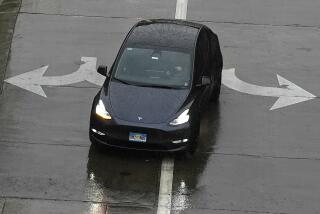Questioning Efficiency of the New GM Electric Car
âZero to 60 in 220vâ (Oct. 14) perpetuates the misconception that electric cars will be âpollution-free.â Pollution comes from the power plant that generates electricity and the factory that produces batteries.
Electric cars consume more fuel than efficient internal-combustion vehicles because energy is required to power the vehicle and energy is lost in transmission lines between the power plant and the car. Pollution is transferred from the city to the power plant.
A study conducted at Carnegie Mellon University and Georgia Institute of Technology (Environmental Science & Technology, September 1996) concluded that âbattery-powered vehicles may result in adverse impacts that are substantially larger than the air quality benefits that will result.â The mining, smelting and recycling of 1,000 pounds of lead for the batteries in each of half a million vehicles âwould increase national lead discharges to the environment by about 20%. Peak ozone levels would decrease about 1 part per billion in Southern California.â
We are seriously mistaken in thinking that electric vehicles will reduce pollution.
DANIEL C. HARRIS
Ridgecrest
*
Your color spread on the General Motors EV1 car is artistically splendid but its editorial content raises my spleen. I know that you are mostly repeating things that GM and the smog people have supplied, and because it is technical you donât feel like challenging it. But if a politician fed you misleading statements and even untruths you would jump on him. The electric car is too important to be treated lightly and too complex to allow a report to give only the sales data.
GM touts the EV1 as âthe worldâs most energy-efficient vehicle, built on the most advanced vehicle platform ever devised.â Any Chevrolet-Geo dealer will be happy to sell you a Geo Metro that is considerably more energy-efficient than the EV1 and probably just as advanced, although I canât measure âadvancement.â The data given in your article says that the batteries contain about the equivalent of 2 gallons of gas and weigh 1,175 pounds. Because this carries the car 70 miles, it has the equivalent of 35 miles-per-gallon economy. The Geo Metro is certified by the EPA to go over 50 miles on a gallon of gas, or 500 miles on its 65-pound fuel supply.
FREDERICK A. JENNINGS
Woodland Hills
*
A small two-passenger car with a range of 70 to 90 miles for $35,000, unless heavily subsidized, will not be attractive to many people.
A more serious shortcoming is the battery pack. Electric storage batteries have been around for more than 100 years, but notwithstanding many improvements, they are still the most troublesome component of modern automobiles. In my experience, they break down after about three years. A replacement would probably cost at least $2,000, which would more than offset lower energy and maintenance cost.
MAURICE SIEGERS
Lakewood
*
Arenât we trying to wish this seemingly wonderful technology into existence?
JAMES A. CARLEY
Rolling Hills






